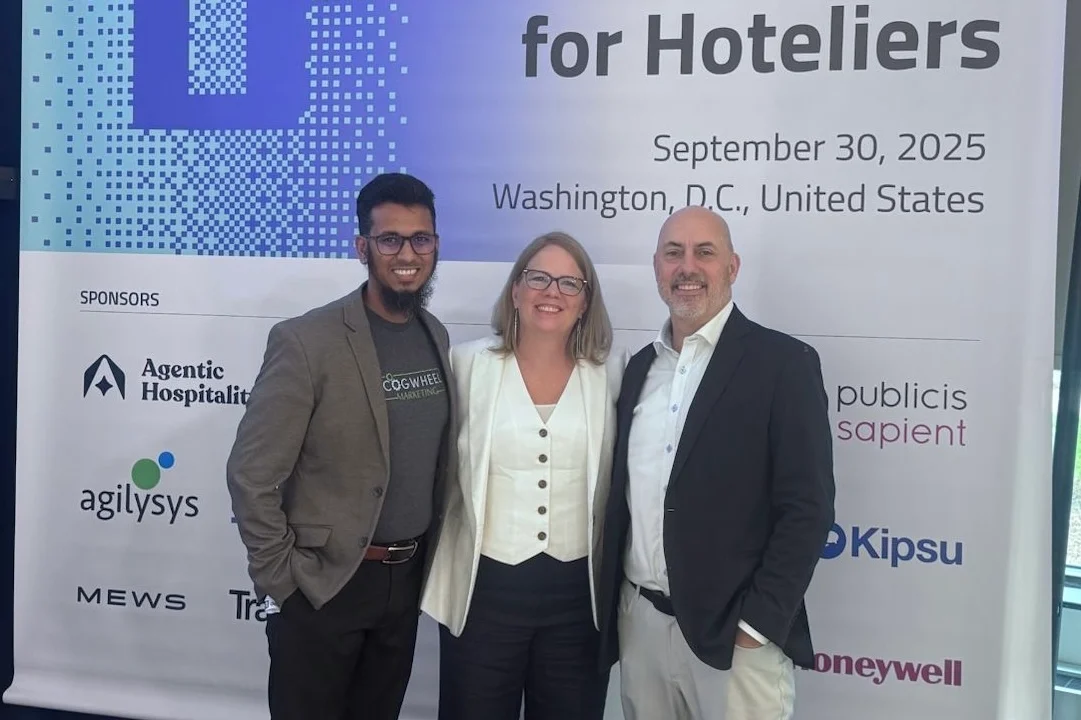The team at Cogwheel (Stephanie Smith, Mike Wylie and Mohammed Razib) attended the Destination AI Conference for Hoteliers in Washington DC on September 30, 2025.
There is a lot of “AI slop” and every vendor is AI-first, AI-enabled or AI-augmented. This conference, in only its 2nd year, was a chance to take a pulse on the industry stance on AI and separate hype from reality.
While I would have wished people would have geeked out more on MCPs and differences in each LLM and their different outputs, there were still a lot of solid take-aways.
What Hospitality Problems are We Solving?
73% of executives believe AI will have a significant or transformative impact on our industry, while 41% think AI is 2+ years away. I believe we can harness it now and make incremental impacts.
But we need to stop looking for a magic bullet in AI and look to layer in AI to solve smaller problems consistently. Focus on solving real business problems, not chasing the next shiny tool.
The top impact areas are consistent across every panel fall into one of these buckets:
- Guest engagement – Meeting travelers where they are, enhancing experiences
- Revenue growth – Packaging, merchandising, customer journey mapping
- Operational efficiency – Cutting costs and automating the “chaos” in back-of-house and front desk.
There was agreement that GIGO (Garbage In, Garbage Out) is forcing us to both consolidate fragmented data and processes while also adhere to a middleware or backbone that AI infrastructure can easily be adapted.
Reviewing AI Myths
We are all still learning about AI, how to harness, train and execute.
- There was a recent MIT study that indicated that 95% of organizations studied get zero return on their AI investment. The panel said the study defined success incorrectly; and that AI had to be scalable across the enterprise, which is not realistic.
- Generally, hospitality is behind in technology. But, consumer adoption of AI in terms of travel planning is actually ahead of retail by 500%. As an industry, we need to embrace trends set by the consumer and follow their lead.
- AI is going to replace humans. It was said over and over: AI won’t replace you, but the person using AI will.
The People Side of Hospitality
AI is moving faster than most of us can process, but the winners will be those who bridge human interaction (HI) + AI.
“Stop throwing tools at employees; make technology invisible.”
There was a lot of discussion about bringing your people along the technology journey. You can’t just drop a tool in their lap and hope they use it.
As an industry, we need to upskill our workforce (a common theme) and use people more effectively to leverage technology.To have an AI-first culture, you need BOTH a top down approach AND a bottom up approach to engage the entire team. Then celebrate the small wins.
Agent-to-Agent: The Next Battleground
It is not just B2B and B2C anymore; we now have to consider A2A (Agent-to-Agent) commerce. In a world where AI agents are making bookings, how do brands differentiate themselves — to machines, not humans? The considerations:
- Be machine-visible – Structure content semantically so AI can “see” and rank you.
- Map intents – AI agents book based on intents (family trip, business overnight, weekend spa). Are you prepared to bundle and serve offers this way?
- Make proof portable – Machines (and savvy travelers) value verifiable claims. Think reviews and validated data, not just marketing copy.
Agent-to-Agent (A2A) commerce means Expedia’s AI agent could book directly with Hilton’s AI agent. Your ARI and content must be structured to play in that world.
Check out the article by Mark Fancourt recapping Agentic AI with a graphic graphic on the future infrastructure.that world.
The Effect on Hotel Marketing and the Customer Journey
For luxury hotels, the goal is how you make people feel. Can AI take the information from their shopping patterns, CRM, PMS and actually understand each customer better to deliver epic personalization? Can it prompt the agent at check in to offer me my favorite wine? Does it give the ability to allow the hotel to communicate with me in my desired language?
We have to make our ARI (Availability Rates Inventory) portable so AI can leverage it, in real time. By doing so the traditional website + booking engine + app combo may no longer be needed.
SEO versus GEO
While the impact to search traffic is expected to shift, less than 1% of traffic from LLMs makes it to hotel websites currently.
As an agency, we have been talking about incorporating GEO into our foundational SEO strategy. This also means transitioning from keyword searches to contextual inquiries and understanding how different personas matter in the booking process.
The big disruptor will be when transactions can be completed by AI; either by humans or agents. We have an opportunity, as an industry, to truly steal back market share from the OTAs.
Hotel Chains on AI
Hearing from the big brands was interesting, but nobody truly showed their cards.
- IHG: Experimenting with robotics in China; limited scale as there are issues deploying in the United States
- Wyndham: Fixated on cost reduction, mostly in call centers and IoT efficiency
- Choice: Incorporating new data points into existing BI data
- Hilton: Wants clean, standardized data to avoid semantic confusion; the industry needs common language and a data dictionary
- Marriott: Obsessed with guest conversations across the full journey
- Hyatt: Focused on lead scoring and RFP responses while balancing latency/speed with governance/safety
The theme? Every brand is experimenting, but none have solved the fragmentation puzzle.
What’s Next for Hotels and AI
What’s clear to me is that AI isn’t a tool; it’s a culture shift. You don’t sprinkle AI on top of broken systems and expect magic.
Winning with AI in hospitality requires clean, centralized data with common semantics and connected systems, an AI-first culture where you upskill your teams, encourage small wins, and test constantly and an alignment of the business problems you want to solve.
This isn’t about dashboards or attribution models anymore. It’s about creating a guest journey that feels personal, efficient, and trusted.

